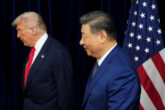June 26, 2017
Drones aren't missiles, so don't regulate them like they are
This year marks the 30th anniversary of the Missile Technology Control Regime (MTCR), a voluntary arrangement founded by seven countries in 1987 to prevent the spread of longer-range cruise and ballistic missiles with the potential to carry weapons of mass destruction. Today, the MTCR has 35 member states, and while containing cruise missile proliferation has proven difficult, it has effectively slowed the spread of long-range ballistic missiles.
With any regime focused on controlling specific technologies, though, there is always a risk that advances in the field will outstrip the initial regulatory framework. Unfortunately, that is exactly what has happened to the MTCR in at least one respect. When the regime was set up in the 1980s, remotely-piloted aircraft—better known as drones—had a lot in common with missiles. They were generally either target drones with limited utility, designed for one-way missions to test missile accuracy, or very short-range surveillance platforms. The MTCR was therefore set up to control them too.
Read the full article in the Bulletin of the Atomic Scientists.
More from CNAS
-
Transatlantic Security / Technology & National Security
Look Before We Leap on Artificial IntelligenceThis article was originally published on The Dispatch. A debate about the role that artificial intelligence should and will play in society, and how it will affect humanity fo...
By Jon B. Wolfsthal
-
Technology & National Security
Caleb Withers on the Cybersecurity Frontier in the Age of AICaleb Withers, research associate at the Center for a New American Security, joins Kevin Frazier, the AI Innovation and Law Fellow at the University of Texas School of Law and...
By Caleb Withers
-
Technology & National Security
Prepared, Not ParalyzedExecutive Summary The Trump administration has embraced a pro-innovation approach to artificial intelligence (AI) policy. Its AI Action Plan, released July 2025, underscores t...
By Janet Egan, Spencer Michaels & Caleb Withers
-
Indo-Pacific Security / Technology & National Security
Sharper: Tech + ChinaRecent talks between President Donald Trump and Chinese Communist Party General Secretary Xi Jinping placed a spotlight on emerging technologies, from high-end chips to minera...
By Charles Horn & Sevi Silvia




